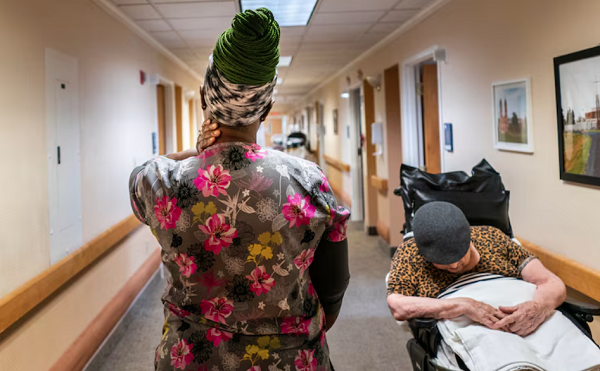The battle over nursing home rules
By McKenzie Beard
August 7, 2024
 The Biden administration is moving full steam ahead on its contentious nursing home staffing mandate, even as it battles legal challenges in court.
The Biden administration is moving full steam ahead on its contentious nursing home staffing mandate, even as it battles legal challenges in court.
The rule, finalized in April, is a game changer for facilities that provide skilled nursing and assistance to people who can’t live independently but don’t need to be in a hospital. It mandates a registered nurse be on-site 24/7 and requires staff to provide residents with at least 3.48 hours of direct care a day, such as feeding, bathing or administering medication.
Much of the final rule is set to be phased in during the next few years, but the policy also beefs up requirements for the self-assessments each nursing home must perform annually to determine whether they have enough skilled workers to properly care for their residents. The Centers for Medicare and Medicaid Services gave operators 90 days to complete the updated facility assessment, and the deadline is Thursday.
It has been a long time coming. President Joe Biden vowed more than two years ago to improve care for the nation’s 1.2 million nursing home residents after decades of complaints about neglect and abuse. His administration’s solution, however, has faced fierce pushback from industry trade groups that claim it’s unworkable.
“Ultimately, this is one piece of a larger, extremely misguided staffing mandate that focuses on red tape, not residents,” said Holly Harmon, senior vice president of quality, regulatory and clinical services at the American Health Care Association/National Center for Assisted Living, the largest assisted-living lobbying group in D.C.
A closer look
Long-term care homes are already required to complete annual facility-wide assessments to gauge resource needs for daily operations and emergencies. The final rule from CMS introduces several pivotal changes:
- Facilities must use evidence-based, data-driven models for staffing and resources, with special attention to residents with behavioral health needs.
- Leadership and direct care workers must actively participate in the assessment, while also incorporating input from patients and families.
- Facilities must develop a comprehensive plan for staff recruitment and retention.
Why it matters: “In this rule, CMS is really focusing on infrastructure that already exists and working with facilities to figure out things that, in the agency’s view, would be helpful for them to accomplish this eventual goal of meeting the new minimum staffing requirements,” said Priya Chidambaram, a senior policy analyst at KFF, a nonpartisan health research organization.
In the field
CMS has issued guidance to help nursing homes with the updated review, but operators find some requirements vague, making it difficult to complete the assessment properly.
For example, the agency says that operators must update their facility assessment when there is a “substantial modification,” but…
[READ THE COMPLETE ARTICLE HERE]
